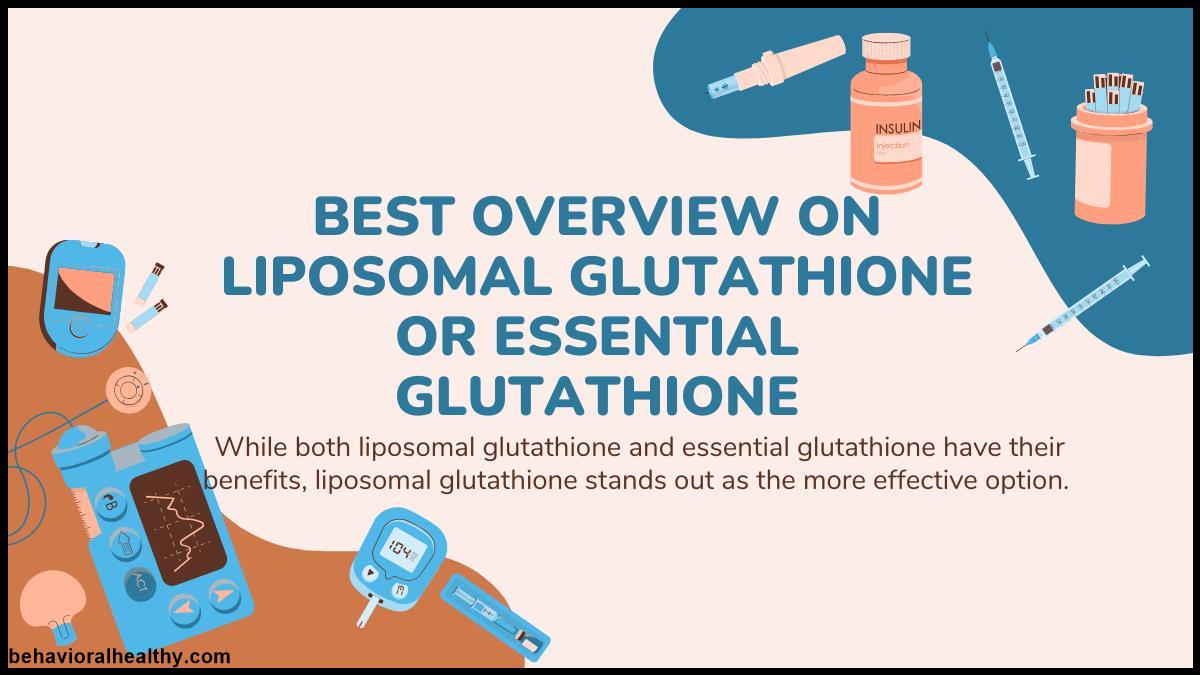While both liposomal glutathione and essential glutathione have their benefits, liposomal glutathione stands out as the more effective option.
Table of Contents
Liposomal Glutathione vs. Essential Glutathione: Which is More Effective?
Glutathione is widely known as one of the most potent antioxidants produced by the body. It helps protect cells from oxidative damage, supports detoxification, and boosts the immune system. However, when it comes to supplementing with glutathione, there are different forms available, and the debate often arises about which is better: Liposomal glutathione or essential glutathione?
In this article, we’ll discuss how these two forms of glutathione differ so you can determine which is better suited to your health goals.
What is Glutathione?
Before discussing the differences between liposomal and essential glutathione, it is important to understand exactly what glutathione is and how it works. Glutathione Liposomal is an antioxidant that is naturally present in every single cell of the body. It neutralizes free radicals, detoxifies the liver, supports immune function, and aids in the absorption of vitamins and minerals.
However, our levels of glutathione are known to decrease as we grow older or experience stressors in our environment. And this is where supplementation falls in. However, not all glutathione supplements are alike.
What is Essential Glutathione?
Regular is also referred to as essential glutathione or non-liposomal glutathione, and it is the original form of the antioxidant. It is usually available as a capsule, tablet, or powder. The essential glutathione you ingest leads through your gut and into your blood system.
However, glutathione does not absorb well in its normal form when taken orally. A good chunk of the supplement is broken down during the digestive process, which means that less than optimal levels of it reach the bloodstream to get to work. This is one of the primary reasons many want alternatives such as liposomal glutathione.
What is Liposomal Glutathione?
Liposomal glutathione is a newer version of glutathione, one that is contained within liposomes. Liposomes, small fat-like structures, encapsulate the glutathione molecule, shielding it from the digestive process and improving absorption. Liposomes are considered to be real carriers, so individual glutathione almost passes the digestive breakdown and gets into the systemic blood more quickly.
The liposomal form of glutathione ensures that a much higher percentage of it reaches the cells where it’s needed, making it far better than basic glutathione.
Liposomal Glutathione vs. Essential Glutathione
Factor | Liposomal Glutathione | Essential Glutathione |
Absorption Rate | High, protected by liposomes for better bioavailability | Low, broken down in the digestive system |
Effectiveness | More effective, greater impact on detox and overall health | Less effective due to poor absorption |
Forms Available | Liquid, capsules, and powders with liposomal technology | Capsules, tablets, or powders |
Ideal For | Detox, boosting the immune system, and energy levels | General antioxidant support |
Side Effects | Rare, mild gastrointestinal discomfort | Possible digestive upset |
Price | Generally, more expensive due to advanced technology | More affordable |
These variations between Essential Glutathione vs Liposomal Glutathione offer different angles, such as highlighting the value of the supplement, focusing on specific benefits, or reminding readers to consult with a professional for the best choice.
Side Effects: Is Liposomal Glutathione Safer?
Glutathione Liposomal is generally safe for most people. Because the liposome serves as a protective aura for the glutathione molecule, it makes it less likely to irritate the digestive tract, an experience that can occur with essential glutathione.
But just like any supplement, sticking to the recommended dosage is key. Some individuals do experience minimal GI upset upon first starting liposomal glutathione, though this irritation is typically short-lived as their body learns to process it.
In contrast, glutathione can occasionally cause digestive upset because of its lower absorption rate and the breakdown of part of the supplement in the stomach.
How to Select the Correct Glutathione Supplement for You
Choosing the right glutathione supplement depends on your individual needs, lifestyle, and health goals. Below are the tips to help you:
- Health Goals
If you want to address specific health concerns like liver detoxification, immune support, or skin health, liposomal glutathione is a more effective choice due to its higher absorption.
- Budget
Liposomal glutathione is more expensive than essential glutathione due to the advanced delivery system. If you’re on a budget or new to glutathione supplementation, you may start with essential glutathione.
- Tolerance
If you have a sensitive stomach or digestive issues, liposomal glutathione may be a better option because it’s gentler on the digestive system.
- Form
Liposomal glutathione is often available in liquid or softgel form, while essential glutathione typically comes in capsules or tablets. Consider the form you prefer for easier consumption.
- Consultation
Always consult with a healthcare provider to determine which form is best for you, especially if you have pre-existing health conditions.
Bottom Line
While both liposomal glutathione and essential glutathione have their benefits, liposomal glutathione stands out as the more effective option. With better absorption and bioavailability, liposomal glutathione ensures that your body gets the full dose of this powerful antioxidant. Whether you’re looking to boost your immune system, improve your skin health, or support detoxification, liposomal glutathione is likely the best choice for achieving your health goals.
If you're considering adding glutathione to your supplement routine, liposomal glutathione is the way to go for superior effectiveness and results.

